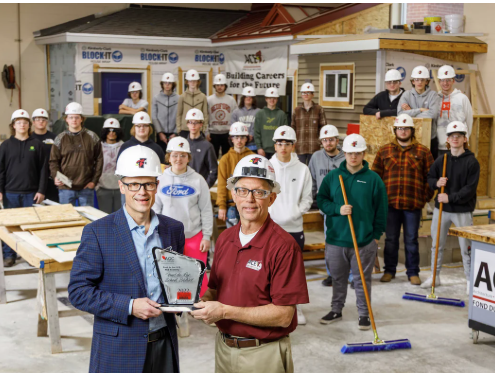High school construction trades programs are playing a pivotal role in shaping the futures of young people by offering them the opportunity to explore hands-on careers that are in high demand. These programs are more than just an alternative to traditional academics; they are a gateway to rewarding and stable careers in industries that rely on skilled workers. Whether it’s carpentry, plumbing, electrical work, or masonry, these programs prepare students for the workforce, teaching them valuable skills that will serve them for a lifetime.
What Are High School Construction Trades Programs?
Construction trades programs in high schools provide students with the chance to learn and develop practical skills related to various construction fields. These programs usually consist of a combination of classroom instruction and real-world, hands-on experience. Students engage in learning about the tools of the trade, reading blueprints, understanding construction safety, and even working on actual building projects. The training often takes place in specialized workshops or simulated job sites within the school, offering students a taste of what it’s like to work in the construction industry.
In many cases, students can earn certifications or college credit while still in high school, giving them an advantage when they transition to further education or enter the workforce.
The Importance of Construction Trades Education
In an era when college degrees are often seen as the primary route to success, construction trades programs stand out as an equally valuable alternative. These programs serve an important purpose, addressing the increasing demand for skilled workers in the construction industry. According to various industry reports, there is a significant shortage of skilled laborers, which creates a wealth of opportunities for those trained in construction trades.
By providing students with the skills they need early on, construction trades programs allow them to transition seamlessly into apprenticeships or full-time employment after graduation. These programs offer a stable path for young people who may not be interested in pursuing a traditional four-year college degree but still want to build a successful and fulfilling career.
Benefits for Students
Career Readiness: Students who participate in construction trades programs often graduate with certifications or apprenticeship opportunities that make them job-ready. The hands-on experience they gain provides them with a competitive edge when entering the job market.
Earning Potential: The construction industry offers lucrative career opportunities, with many trades offering competitive salaries. Jobs such as electricians, plumbers, and carpenters often pay well, and experienced workers in these fields can continue to grow professionally and financially.
Personal Growth and Confidence: Working on real construction projects helps students develop a sense of responsibility and pride in their work. These programs not only teach technical skills but also encourage qualities such as teamwork, leadership, and time management.
Reduced College Debt: For many students, the prospect of taking on significant student loan debt is a concern. Construction trades programs offer a way to earn good wages without the burden of a four-year college degree. Students can gain work experience and start earning money soon after graduation.
Hands-On Learning: One of the biggest appeals of construction trades programs is the ability to learn by doing. Instead of spending hours in a classroom with abstract concepts, students are actively engaged in creating tangible results. This kind of learning can be more engaging and fulfilling for students who prefer a hands-on approach.
How Construction Trades Programs Work
High school construction trades programs are designed to provide a comprehensive education that includes both theoretical knowledge and practical application. The curriculum typically covers essential topics such as:
Tool and Equipment Safety: Students learn the proper handling and use of tools, ensuring they can work safely and effectively on job sites.
Blueprint Reading and Project Design: Understanding how to read and interpret blueprints is crucial for anyone working in construction. These programs often include lessons on reading architectural plans and designing projects.
Basic Construction Skills: Students acquire basic skills in various construction trades, including carpentry, masonry, electrical work, and plumbing.
Workplace Skills: In addition to technical skills, students also learn workplace etiquette, communication skills, and teamwork. These “soft skills” are vital for success in any career, especially in collaborative environments like construction.
In many programs, students are also given the chance to work on community projects, such as building houses or repairing local structures. These real-world projects help students apply what they have learned in the classroom and give them a sense of accomplishment.
Supporting the Next Generation of Skilled Workers
Many communities, businesses, and unions recognize the value of high school construction trades programs and support them in various ways. Some local businesses donate materials, while others offer internships and mentorship opportunities for students. These partnerships create a strong network between schools and the workforce, ensuring that students have the support they need to succeed.
These programs are also making strides in promoting diversity and inclusivity. In the past, certain trades have been dominated by specific groups, but many schools are working to break down these barriers. By encouraging students from all backgrounds to pursue careers in the trades, these programs help ensure that the workforce of tomorrow is as diverse as the communities they serve.
Preparing for a Successful Future
High school construction trades programs provide a solid foundation for students who want to enter the workforce directly or pursue further education in specialized fields. The skills learned in these programs are transferable, meaning students can explore a variety of career paths or continue their education in trade schools or apprenticeships.
The construction industry is expected to continue growing, with many opportunities for skilled workers in the coming years. Whether students choose to become general contractors, electricians, or specialized technicians, the knowledge and experience gained in high school construction trades programs will serve them well.














